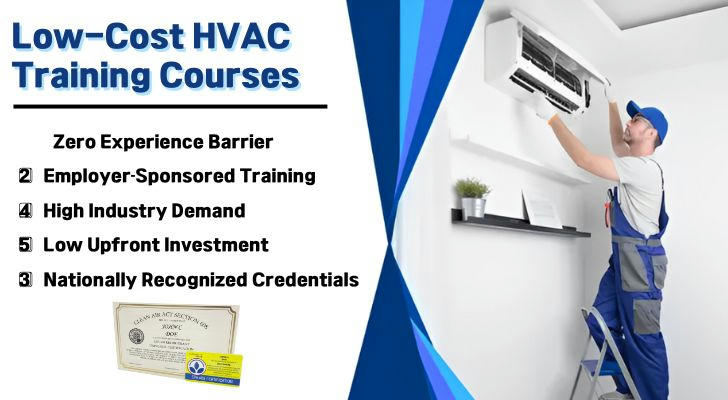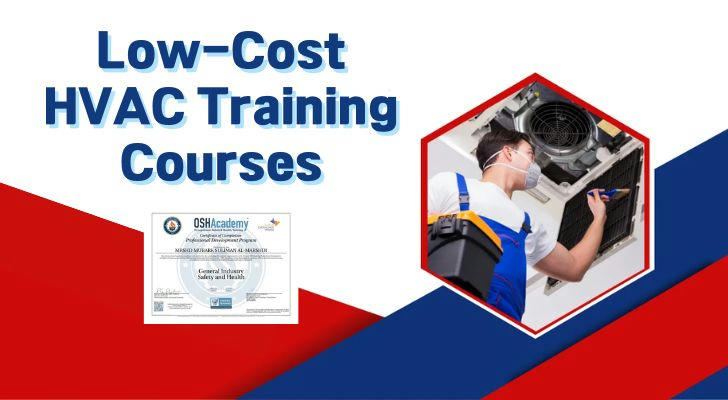Low-cost, no-burden HVAC training courses - no experience required
Employment in HVAC is projected to grow 9% from 2023 to 2033, much faster than the average for all occupations. Accelerated HVAC training is a fast track to a stable career. These programs remove traditional barriers—no HVAC background required, minimal upfront costs, and paid training — therefore, motivated individuals can earn an industry-recognized certificate in as little as 102 hours of coursework.

Why Choose low-Cost HVAC Courses
1️⃣ Zero Experience Barrier – Open enrollment means candidates with a high‑school diploma or GED can start immediately, bypassing lengthy prerequisites. According to the U.S. Bureau of Labor Statistics, HCAV job vacancies are expected to average approximately 42,500 per year over the next decade.
2️⃣ Paid training – Many employer-supported training apprenticeship programs offer paid on-the-job mentoring, allowing participants to learn in a real-world environment. Registered apprenticeship programs combine work with classroom training to develop well-rounded skills.
3️⃣ Nationally Recognized Credentials – Programs align with EPA 608, NCCER, and Journeyman certifications, ensuring graduates meet federal and industry standards. These credentials are portable across states, enhancing long‑term career mobility.
4️⃣ High Industry Demand – The U.S. Department of Labor projects significant growth for HVAC mechanics through 2032, driven by energy‑efficient building regulations and climate control needs .
5️⃣ Low Upfront Investment – Through Workforce Innovation and Opportunity Act (WIOA) support, GI Bill transfers, or community‑college partnerships. Many candidates qualify for subsidies covering tuition, materials, and exam fees .
What cost-effective HVAC courses are available to you
📚️ CrossPurpose (Denver, Colorado)
Duration: Approximately 3 months
Cost: Course fees are supported and a small living stipend is provided
Certificate: Course certificate is obtained upon completion
Course content: Basic knowledge and practical experience in residential and commercial heating and cooling
Suitable for: Students who want comprehensive training and career support
📗️ Alison – Becoming a HVAC Professional
Format: Online self-study
Cost: Course fees are supported, and certificate fees are required
Certificate: CPD certified certificate
Course content: Covers the basic principles and maintenance knowledge of HVAC systems
Suitable for: Students who want to systematically learn the basics of HVAC
📘 HVACRedu.net (for high school students)
Format: Online self-study, totaling 102 hours
Cost: The cost of the program is supported by the National High School Program. Any applicant may receive additional state grants, and the Alabama Women's Foundation offers two scholarships for women who wish to participate in the program.
Certificate: Certificate is available upon completion of the course
Course content: Designed for high school students, introduces the basics and techniques of HVAC/R systems
Suitable for: High school students or beginners who want to learn about the HVAC industry
📒 Keefe at Night (Massachusetts)
Format: 200 hours, offline teaching.
Cost: Supported by CTI
Course content: The course includes OSHA certification, practical training and career development training to help students take the Massachusetts Oil and Gas Burner Technician Certification Examination.
Suitable for: Suitable for students who want to obtain certification in Massachusetts.
📙 Goodwill Industries of the Southern Piedmont (North Carolina)
Format: 14 weeks of offline training
Tuition: Tuition is supported.
Features: Includes installation, maintenance and troubleshooting of HVAC systems.
Certificate: Provides NCCER HVAC Level 1 and EPA 608 certification.
Suitable for: Suitable for students who want comprehensive support and guidance.
📖 Other programs:
WIOA supported programs: such as Western Technology Center, less than 12 weeks to obtain a certificate.
GI BILL supported programs: VETERANS GI BILL V3 APPRENTICESHIP TRAINING PROGRAM-paid on-the-job training, gradually obtain industry-recognized certifications, such as EPA 608, Journeyman, Masters.
How to Apply for Low-Cost HVAC Courses
Basic Qualifications
Eligibility criteria vary by program, but generally include:
Age Requirement: Applicants must be 18 years or older.
Educational Background: A high school diploma or equivalent is typically required.
Residency: Some programs may have state or local residency requirements.
Application Steps
1️⃣ Research Programs: Identify HVAC training programs that align with your career goals and eligibility.
2️⃣ Prepare Documentation: Gather necessary documents such as proof of age, educational certificates, and income verification.
3️⃣ Submit Applications: Complete and submit applications before the specified deadlines.
4️⃣ Attend Information Sessions: Participate in mandatory information sessions or interviews as required by the program.
Success Stories: Transforming Lives with Low-Cost HVAC Courses
John, a 28-year-old former retail worker, enrolled in the HVAC training program at Goodwill Industries of the Southern Piedmont. Without prior experience, he completed the 14-week course, earned his certifications, and secured a position with a local HVAC company. Today, John enjoys a stable career and looks forward to further advancement in the industry.
Low-Cost HVAC Courses Job Responsibilities
Graduates of HVAC training programs can expect to perform tasks such as:
Installation: Setting up heating, ventilation, and air conditioning systems in residential and commercial settings.
Maintenance: Conducting routine checks and servicing HVAC equipment to ensure optimal performance.
Troubleshooting: Diagnosing and repairing issues within HVAC systems.
Compliance: Ensuring all work adheres to local codes and safety regulations.
Customer Service: Interacting with clients to explain system functions and maintenance procedures.
Career Development Recommendations by Age Group
| Age Group | Recommended Pathways |
|---|---|
| 18–24 | High school programs like HVACRedu.net - Entry-level certification courses |
| 25–34 | Intensive training programs like CrossPurpose - Community college courses |
| 35–50 | Flexible online learning options like Alison's online courses - Evening classes like Keefe at Night |
| 50+ | Short-term certification programs - Refresher courses to update skills |
Start Your Low-Cost HVAC Courses Career!
Embarking on a career in HVAC offers numerous benefits, including job stability and opportunities for advancement. With various training programs available across the country, individuals can find courses that fit their schedules and learning preferences. Whether you're starting fresh or seeking a career change, HVAC training programs provide the skills and certifications needed to succeed in this essential industry. Take the first step toward a rewarding career by exploring the program that best suits your needs.

